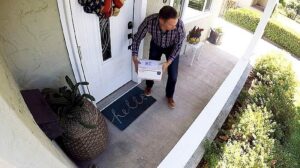
With porch pirates, cyber thieves, scammers and fake gift cards floating around, the holidays have become open season on shoppers.
You simply have to be aware of the dangers that lurk whether you shop online or head to your nearest mall.
“If you are aware of the scam, if you learn about it from listening to the news, you are 80% less likely to be scammed,” said Kathy Stokes, director of AARP’s fraud prevention programs, in a story that appeared on CNBC.com
Here’s what you need to know before you purchase anything online or in person:
Gift Cards
About 1 in 5 say they have received a card with no money on it. How does that happen?
Thieves tend to target gift cards on racks. They get an account number and PIN and when the card is activated they receive a notification and get the money.
Avoid buying gift cards from racks and third party websites.
Your best bet is buying a gift card from behind the register or go directly to a retailer’s website.
Fake Nonprofit Requests
There are dozens of legitimate nonprofits seeking donations this time of year. But there are many that advertise community programs and donation requests that are simply bogus.
A study conducted by the AARP found that only 50 percent of Americans actually research the organizations where they send money.
“Fraudulent organizations may try to trick you by having a name that is very similar to a legitimate 501(c) group,” said Ashley Post, communications manager at Charity Navigator, which evaluates charities.
A quick Internet search can help you determine whether an organization is legit. Check out CharityNavigator.org, Give.org, CharityWatch.org and GuidesStar.org. Some of these sites will even provide more detailed information about a nonprofit’s focus and its finances.
Porch Pirates
Most of us by now have seen the videos of people stealing packages from a person’s front door. Porch pirates are out in force this time of year.
There are several ways to ensure your packages don’t get stolen.
- Take advantage of an online retailer’s delivery sites. Amazon, for example, has pickup locations in most U.S. cities.
- Schedule a delivery and make sure someone is home to receive the packages.
- Have items delivered to an address where someone can receive them for you. Many people have packages sent to their work. Just check with your boss first.
Phone & Email Scams
These rules apply year-round.
- Don’t open an email from someone you don’t know.
- Don’t open attachments or click on a link unless you know the sender.
- If someone calls and claims they represent a government agency, want you to take out a loan or represents Microsoft seeking to access your computer – hang up.
Ex-con man Frank Abagnale, the subject of the movie “Catch Me If You Can,” says scammers use two basic strategies on their victims. Watch this video to learn about the two red flags you will see in almost every scam.
More Tips
Take a look at these 10 steps you can take to avoid fraud.

